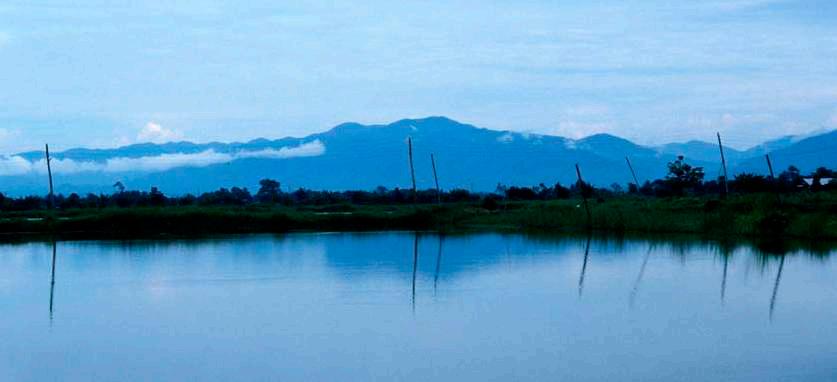
4 minute read
Be Still and Know
by USPG
WRITTEN BEFORE EASTER IN THE CONTEXT OF THE COVID-19 GLOBAL PANDEMIC
Be still and Know (Psalm 46:10). And I am not saying that by being still we will be ready to know - no. Just by being still we will know. Being still and knowing are the same phenomenon, because when we are still like a mirror, a still lake, no ripples, then the whole firmament, the whole sky, is reflected in the lake. The stars come down, and the moon, and the clouds - all are reflected in tremendous beauty in the lake.
When our consciousness becomes a still mirror, a still lake, a silent reservoir of energy, God is reflected in it.
We will not attain to knowledge, remember. We will become wise, we will become a Jesus. We will not become a great scholar, a great pundit, a great theologian or a philosopher. We will be a Jesus. We will have an innocent kind of knowing: we will know how to live, we will know how to die, we will know how to love - we will know the real art of life. And the real art of life consists only of three things: how to live, how to love, and how to die or in other words how to meet, how to engage and how to depart.
And these things we will know from scriptures; these things we will know from our innermost core...
ISSUE 1 2020
By the Rev’d Dr Packiam T Samuel, Director, Henry Martyn Institute, India
Prayer services and daily and Sunday services were all cancelled, and some dioceses had already announced they would not have services during Holy Week or Easter on April 12.
The first Sunday of Lent was business as usual, but by the second week, some dioceses had urged parishes to curtail hand-shaking at the sign of peace and Communion from the chalice. By the next week, many dioceses were no longer having public services and that list continues to grow as a nation is advised to stay at home to curb the spread of the Coronavirus.
And now, with many public places shuttered and a country practicing its new term of selfdistancing, the sense of quarantine, although not fully imposed, is very real. This year’s Lent has been unusual, but many have pointed out that the penitential qualities tied to this health crisis - suffering, giving up and solitude - are in fact symbolic of Lent’s spiritual practice of self-denial.
Even the very word, quarantine, means about 40, in French, and its Latin origin, “quadraginta,” is the root of Latin words for Lent. This symbolism is not lost on many. A number of people have compared the notion of quarantine to Christ’s 40 days in the desert and the 40 days of Lent. We need to look at this as a temporary thing we are doing for the sake of another good, the current time of staying in place to prevent Coronavirus spread, adding that it could be viewed as a period of retreat with extra time for prayer or spiritual reading.
We can call the current situation our opportunity to be in the desert like Jesus, with time away in solitary prayer, which is something that couldn’t be more Lenten. With the halt to normal routines for many, at a minimum, we now have extra time to spend in prayer each day - prayer that is sorely needed to seek eternal
repose for the dead, to remember those who are sick and living in great fear, our health care workers who remain on the front lines of this disease, and for one another.
We may never again have a Lenten season that affords us so much time to give to the Lord. Let us use this time wisely and well, along with extra time to pray, the current pandemic also offers a heightened perspective.
We began Lent with the imposition of ashes and the reminder, ‘Dust thou art and unto dust thou shalt return,’ a phrase borrowed from the funeral liturgy. None of us could have predicted how quickly we would become so focused on the finiteness and fragility of human life - this is one of the spiritual lessons of the Coronavirus. These initial sacrifices were made prior to the country’s complete shift to the point where everyone is giving something up from mundane items to time with friends and family at public places and the far more tragic losses of jobs and health.
Forthcoming weeks offer challenges we’ve never had to face. We can’t attend Sunday services. Our routines are disrupted. We worry about ourselves and our loved ones. Some of us may even need to fight the virus itself.
The pandemic made the Lenten season dramatically different from any other in our lifetimes, no matter how old we are. Lent was what it has always been: A time to get in better touch with God’s love for us and do our best to ‘spring clean’ our souls in preparation for the glory of Easter. This year, the liturgical season became a time to think about how we live as a community, protect each other from illness, and be part of the solution to a global health crisis. We remain hopeful that we will all meet these challenges, and maybe even bring about new and better ways of taking care of each other in the years to come.
Lake Toungou, Myanmar Credit: USPG/Leah Gordon











